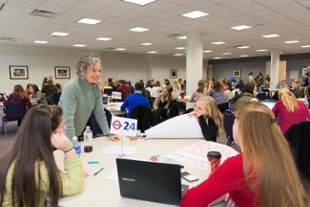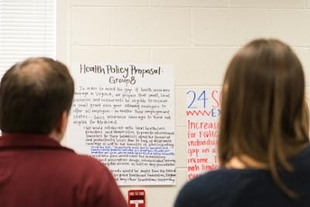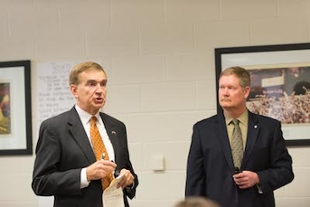Bridging the health insurance gap
News
State Sen. Emmett Hanger and Del. Tony Wilt joined students from the College of Health and Behavioral Studies for an interprofessional health policy summit at JMU to explore solutions to the insurance gap in Virginia.
After being briefed on lawmakers’ decision not to expand Medicaid in the commonwealth as allowed under the federal Affordable Care Act, students from nursing, social work and health sciences were assigned to teams and tasked with devising a plan to help 400,000 uninsured Virginians access affordable care. Their plan could not include a request for additional Medicaid funding.
“This is your chance to impact policy,” said Dr. Julie Sanford, head of nursing, who advised the students to think creatively about not only potential solutions to the problem, but also how to fund them.

Three teams were chosen by their peers to present proposals to Hanger and Wilt for consideration. The proposals covered establishing five regional public health care centers around the state, to be funded in part by an increase in the “sin tax” on items like alcohol and tobacco; legalizing marijuana and privatizing liquor sales in Virginia to free up money for community health programs; and offering incentives to small businesses that develop market-based solutions to gaps in coverage as well as to hospitals and other health care facilities that use them.
The lawmakers were impressed with the students’ ideas.

“It’s good for young, creative minds to get involved in initiatives like this and provide some inspiration,” Hanger said. “Unfortunately the debate that’s unfolded over the last several years has become so polarized politically that we’ve gotten away from what we should be doing — focusing on how to deliver health care to those who can’t afford it and don’t have the access.”
“We could have used an exercise much like this in the General Assembly,” Wilt agreed. “This is the kind of effort that it will take for us to get beyond the impasse and to come up with a viable solution to the insurance gap.”
"We could have used an exercise much like this in the General Assembly. This is the kind of effort that it will take for us to get beyond the impasse and to come up with a viable solution to the insurance gap." — Del. Tony Wilt
The Dec. 4 summit was hosted by the new JMU Health Policy Collaborative, a partnership between faculty from multiple disciplines to educate students, organizations and the community through interprofessional engagement.
“In an era of increasing incidence of health-related concerns and growing complexity of health care, it is critical to bring awareness to issues surrounding health policy, and to prepare our students to understand and advocate,” said Dr. Sharon Lovell, dean of the College of Health and Behavioral Studies.
###

